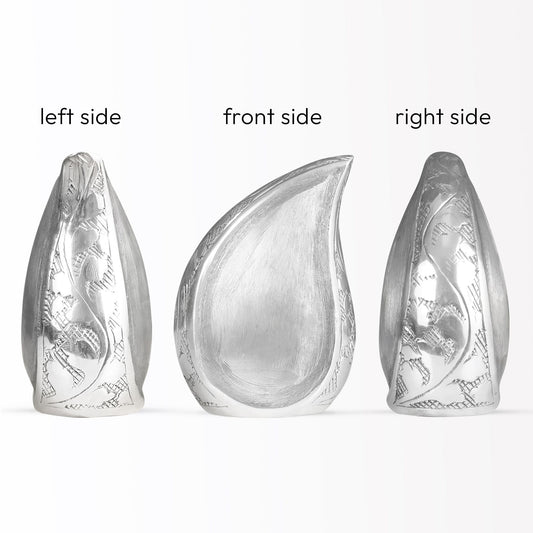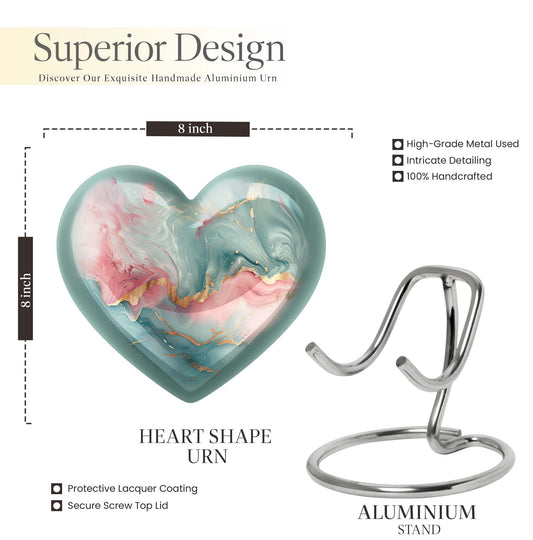Popular Urns
Understanding Washington State Cremation Laws: Process and Implications

Cremation has picked up steam in its simplicity, affordability, and flexibility. Similar to most states, the State of Washington has set forth certain legislation that makes sure such a process is done respectfully and legally. These are very important for individuals and families seeking the use of cremation for understanding.
Important Cremation Laws in Washington State:
- Taking the authority in hand

It is the legal next of kin of the deceased, or whoever is named in a legal will left by the deceased, who must give authority to cremate any loved one in the State of Washington.
"If the dead died without stating any will, then this responsibility goes to the nearest relatives, represented either by the spouse or adult children". Under Washington state law, such permission shall always be reduced to writing form, and only upon receipt of the same, the cremation can proceed accordingly.
- Permit for cremation
A permit for cremation beforehand is required in every case. This comes from the local health department or some regulating body. The process would involve the preparation and filing of a cremation authorization form, which would contain information including details of the deceased, funeral home or crematory handling, and method of disposition which might involve scattering of ashes. This permit ensures that all legalities are met and that the cremation is done according to the state's regulations.

- Waiting Period time
In Washington State, for instance, there is a statutory waiting period before cremation can be performed; this is usually 48 hours from such a time of death. The waiting period may allow time for necessary legal and medical paperwork to be attended to, and time for the family to make considered decisions about the cremation.
- Death Certificate Requirement
A death certificate has to be completed and filed with the state before cremation can take place. It is a document that has to be signed by a licensed physician or medical examiner in order to verify the cause of death and is usually required for the permit of cremation. The crematory will not act without this important document.
- Disposition of Ashes
Once the process of cremation is done, the ashes, or cremains, are returned to the family in a cremation urn or other container.
According to Washington state law, there are several options with regard to the ashes for the families: scattering in a specially designated area, keeping in a memorial urn, or interring in a cemetery. The property owner's permission must be sought if the ashes are to be scattered on private property.

- Crematories
In Washington State, crematories are very highly regulated to make sure that they conduct business in an ethical manner and also that their operations are clean and safe. They must be licensed with the state and have regulations regarding how human remains are to be treated, equipment should be maintained, along with records kept. It all helps in protection of dignity for the deceased along with carrying out proper cremation.
- Pre-Need Arrangements
Pre-need cremation arrangements, where the individual is able to pre-plan and pre-pay for their own cremation services, are also permissible under Washington State law.
These will increasingly relieve stresses from families and perhaps better ensure that specific wishes about the cremation process are honored. Suffice it to say that you'll want to utilize the services of a good funeral home or crematory in order to assure that your pre-need arrangements are legally binding and well documented.

Implications to Individuals and Families
Understanding and working through such cremation laws have various implications for individuals and families, including the following:
- Ensuring Compliance
The nature of compliance with the cremation laws of Washington State is to help avoid legal challenges, ensuring the process of cremation is done as stated in the laws. This is critical in retaining integrity and the will of the deceased concerning his/her death.
- Planning and Decision Making
The waiting period, permits required, and authorization procedure add to knowledge that enables planning effectively by the families in making feasible decisions. As a matter of fact, this may be very vital knowledge in liaising with funeral homes and crematories to undertake an appropriately streamlined process.

- Dignity to the Dead
The State of Washington has set regulations concerning cremation-the main intent of the process is respect and ethics to the dead. The policies safeguard the dignity of a dead person and respect in caring for the remains.
- Cost Considerations
Although cremation usually tends to be less expensive than a traditional burial, understanding what needs and permits are legally owed will better prepare a family budget for any additional costs that may arise. The earlier planned in the process, the less cost involved, and hence fewer surprise fees one has to deal with.

Conclusion:
From authorization and permits down to ashes handling, everything has some kind of regulation concerning dignity for the deceased and guidelines for whoever deals with it. Given that cremation is one of today's most popular ways of end-of-life planning, understanding such laws may be the path to smoother, decent experiences.
ALSO READ:
Phrases To Engrave on Cremation Urns
Types Of Funeral Traditions In US

























































































